Trump fires acting attorney general opposed to travel ban

Then-Deputy Attorney General Sally Yates speaks at the Justice Department in Washington in 2016. President Donald Trump fired acting Attorney General Sally Yates after she ordered Justice Department lawyers to stop defending refugee ban. File photo: J. David Ake/AP Then-Deputy Attorney General Sally Yates speaks at the Justice Department in Washington in 2016. President Donald Trump fired acting Attorney General Sally Yates after she ordered Justice Department lawyers to stop defending refugee ban. File photo: J. David Ake/AP
Washington - US President Donald Trump wasted little time
Monday in removing the acting attorney general from office after she
said she would not defend his executive order on immigration in
court.
Trump fired Sally Yates, a Obama administration holdover, just hours
after she issued a statement saying the Justice Department would not
defend the controversial executive order "for as long as I am acting
director."
A White House statement said Yates "betrayed" the Department of
Justice "by refusing to enforce a legal order designed to protect the
citizens of the United States."
The statement said Trump "relieved" Yates of her duties and named
Dana Boente, US attorney for the Eastern District of Virginia, to
serve as acting attorney general until Senator Jeff Sessions is
confirmed by the Senate.
Dana Boente, US Attorney for the Eastern District of Virginia. File photo: Reuters
Yates was appointed by US president Barack Obama who had agreed to
serve Trump until Sessions was confirmed.
Yates issued her statement as angry reaction to Trump's executive
order issuing the travel ban, which affects the citizens of seven
majority-Muslim countries and refugees from countries in conflict,
mounted and protests across the United States raged.
The White House was adamant in its defence of the immigration order
despite all the controversy it has stirred. Spokesman Sean Spicer
held firm to the position that the temporary ban has been good for
the security of the country.
"The president's gonna be very proactive with protecting this
country," Spicer said. "We're not gonna wait until we get attacked
and figure out how we can make sure it doesn't happen again."
He repeated the administration's argument that only 109 people out of
approximately 325,000 passengers who arrived in the US on Sunday were
detained for questioning.
They were all cleared to enter, he said, adding they had been
temporarily detained "to make sure that the safety of the other 324
million Americans was put first.
He said the 109 people were in transit when the executive order was
issued as part of Trump's "extreme vetting" approach to preventing
terrorists entering the country.
But controversy and uncertainty spread around the world because an
unspecified number of others were stopped before beginning their
journeys. Spicer said they would now be put through additional
vetting at consulates in their home countries.
Trump's order banned citizens from Syria, Yemen, Iran, Iraq, Somalia,
Libya and Sudan for 90 days, temporarily suspended refugee admissions
for 120 days and banned refugee admissions from Syria indefinitely.
Trump also faced pressure from several US companies that voiced
concern about the effects the order would have on their workforces.
Washington state Attorney General Bob Ferguson also announced plans
to file a lawsuit that would seek to have key provisions of the order
declared unconstitutional.
In addition Trump's order also faced criticism from fellow
Republicans in Congress, including Lindsey Graham, a senator from
South Carolina, who said the order was too broad and incompetently
implemented.
Protests that continued Monday across the country prompted Obama to
weigh in on a policy for the first time since leaving office on
January 20. Obama said through his spokesman Kevin Lewis that he
supported the protests taking place across the country and was
"heartened by the level of engagement."
Lewis said Obama "fundamentally disagrees with the notion of
discriminating against individuals because of their faith or
religion."